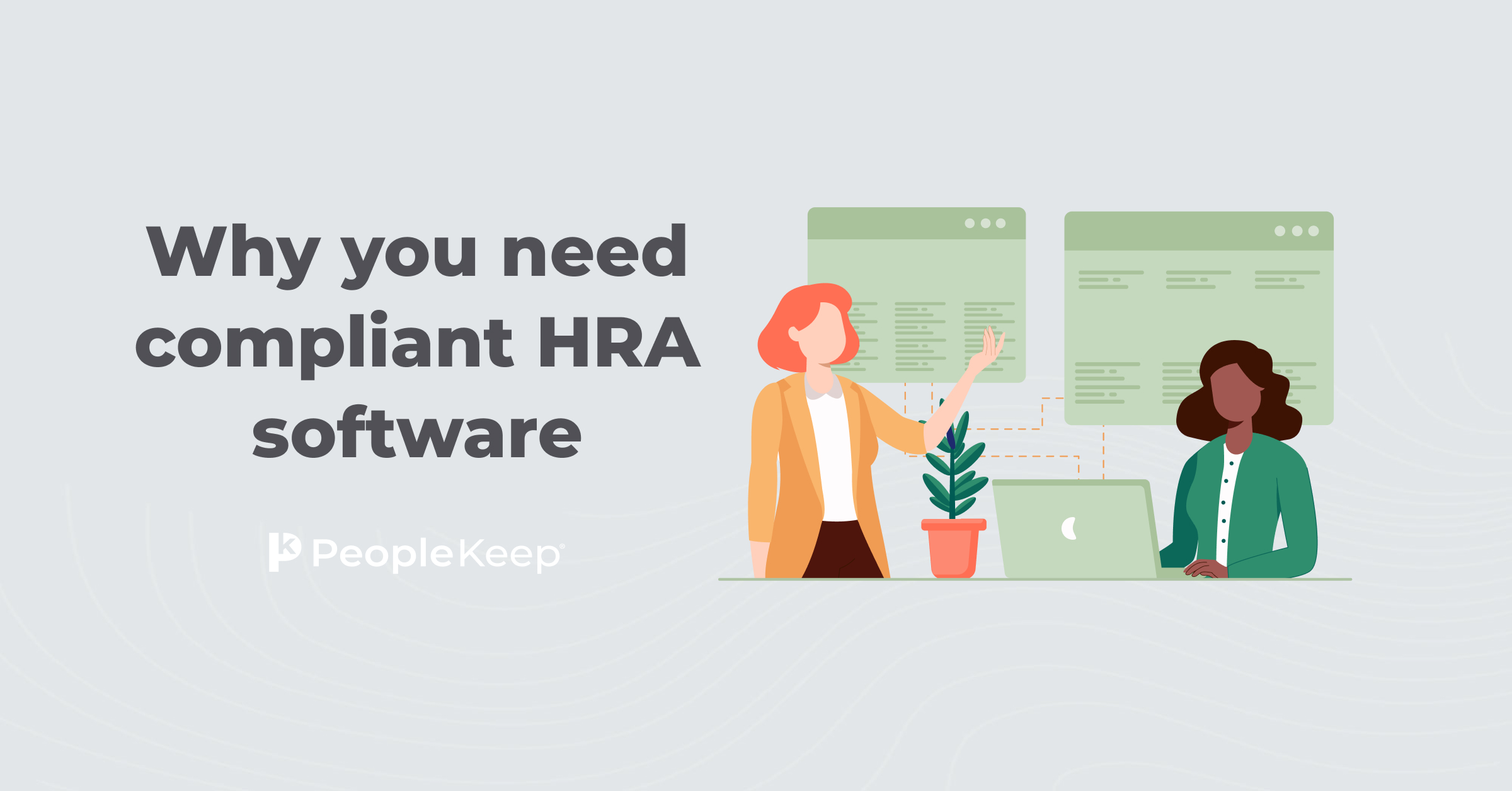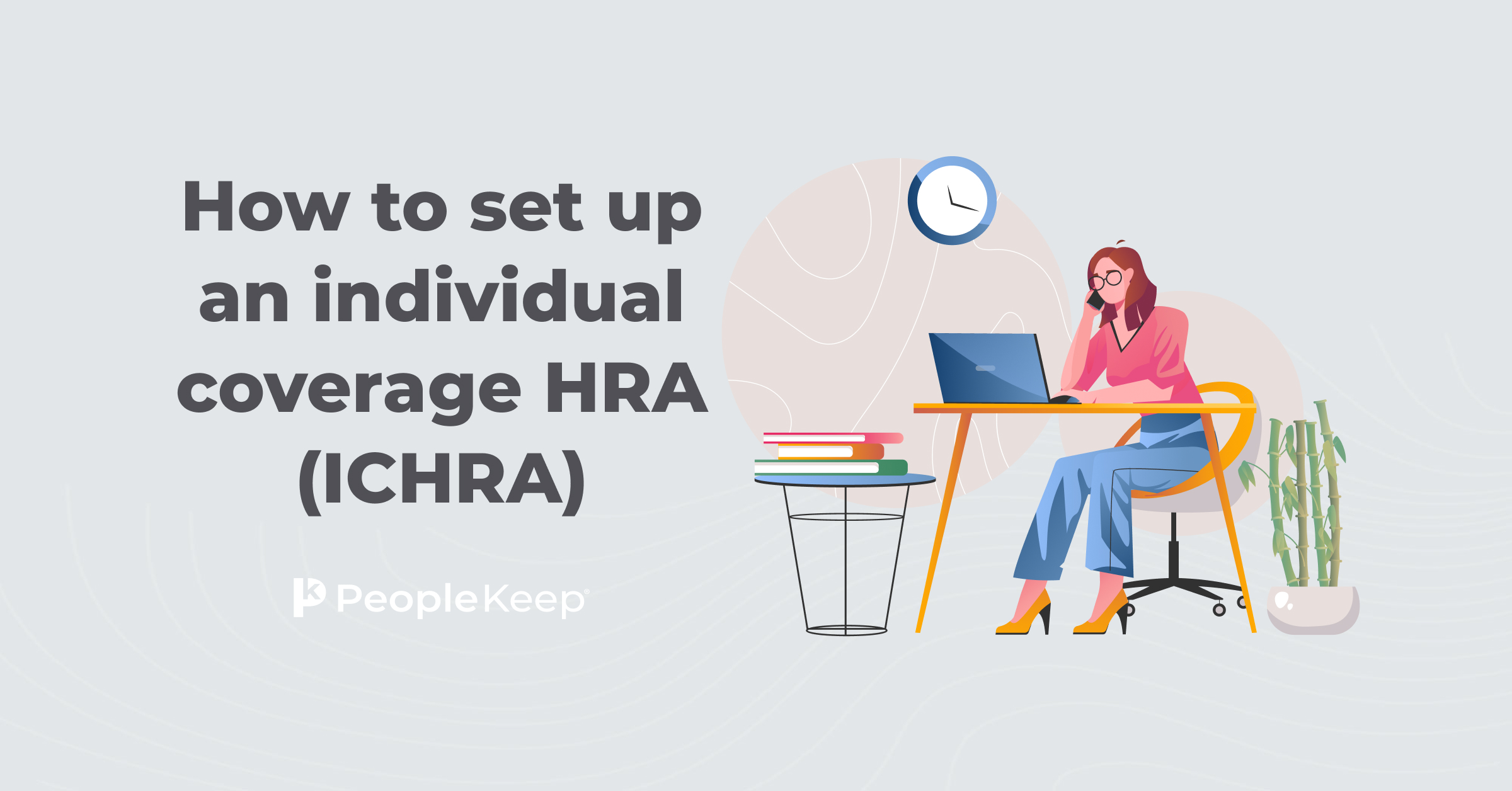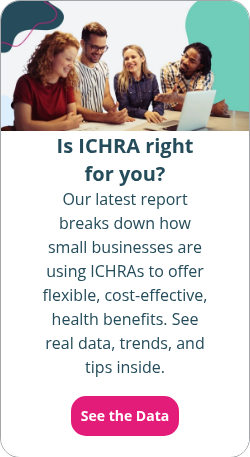How ERISA affects ICHRA
By Holly Bengfort on October 25, 2023 at 8:00 AM
The Employee Retirement Income Security Act1 of 1974 (ERISA) is a federal law that governs employee benefit plans, including employer-sponsored health insurance. Under ERISA, employers that offer health insurance to their employees must adhere to certain regulations and guidelines. While it’s not an insurance policy, the individual coverage health reimbursement arrangement (ICHRA) is considered a group plan and is therefore subject to ERISA regulations.
In this article, we'll explore how ERISA affects ICHRA and what employers need to consider when implementing this type of health plan.
What is an ICHRA?
First, let's understand what an individual coverage HRA (ICHRA) is. An ICHRA is an affordable alternative to a traditional group health plan that allows employers to reimburse their employees for qualifying medical expenses.
Instead of employers picking a one-size-fits-all insurance policy for their entire team, an ICHRA allows employees to choose the individual health insurance policies that work best for them. Employees must have individual health insurance coverage with minimum essential coverage (MEC) to participate in an ICHRA.
An ICHRA is a great solution for applicable large employers (ALEs)—employers with 50 or more full-time equivalent employees (FTEs)—that need to satisfy the Affordable Care Act's (ACA) employer mandate. Under the mandate, ALEs must offer affordable coverage with MEC and minimum value to at least 95% of their full-time employees.
Additionally, an ICHRA allows for greater flexibility for employers compared to a traditional group health plan. Employers can use employee classes to separate their eligible employees into different groups. Then, each class of employees can receive a different monthly allowance.
There are 11 employee classes2, including:
- Full-time employees
- Part-time employees
- Seasonal employees
- Temporary employees
- Salaried employees
- Hourly employees or non-salaried employees
- Employees covered under a collective bargaining agreement
- Employees in a waiting period
- Foreign employees who work abroad
- Employees working in different geographic locations
- A combination of classes above
Unlike other types of HRAs, there aren't any maximum employer contribution limits with an ICHRA, so you can offer your employees as little or as much as you choose. There are also no minimum class size requirements in most circumstances.
What is ERISA?
ERISA establishes minimum standards for employer-sponsored retirement and health plans. It ensures that employees receive certain protections and rights when it comes to their retirement savings and other benefits.
ERISA outlines various requirements3 for employee benefit plans, including providing participants with plan information, setting minimum standards for participation and funding, establishing fiduciary responsibilities, and ensuring a process for participants to appeal benefit decisions.
It also grants participants the right to sue for benefits and breaches of fiduciary duty and guarantees payment of certain benefits through the Pension Benefit Guaranty Corporation4 (PBGC) upon plan termination.
ERISA generally doesn't apply to plans established or administered by governmental entities or religious organizations. Additionally, it doesn't cover plans specifically designed to adhere to workers' compensation, unemployment, or disability laws.
The federal government has amended ERISA many times over the years to introduce new protections. Two of the most important additions were the Consolidated Omnibus Budget Reconciliation Act (COBRA) and the Health Insurance Portability and Accountability Act (HIPAA).
How does ERISA apply to an ICHRA?
Since an ICHRA is an employee benefit plan, it falls under ERISA regulations. This means that employers offering an ICHRA must comply with certain requirements.
ERISA regulations state that every employee benefit plan must be “established and maintained pursuant to a written instrument.” Employee benefit plans must include a formal plan document that defines the plan and is made available to employees and their families, as required by ERISA regulation.
ERISA requires you to include several items in your ICHRA plan documents:
- The responsibilities of named fiduciaries and plan administrators
- Requirements for ICHRA eligibility
- The effective participation dates
- A description of benefits, both included and not included
- The funding and payment process of the ICHRA
- Procedures for claims
- HIPAA privacy officers and the special rules surrounding protected health information (PHI)
- Information regarding federal mandates
- The process of amending the plan
- The process for plan termination
An employee health plan must also include a summary plan description (SPD). This provides a summary of the complete plan document to eligible employees. The SPD must be clear, comprehensive, and easily understandable by employees.
The SPD provides information on:
- Detailed description of plan benefits
- When an employee can participate in the plan
- How you calculate the services and benefits
- Who can contribute to the plan
- When benefits become vested
- When and in what form you pay out benefits
- How to file a claim for benefits
- What features the benefits include
- Rights for plan participants
Although there are no specific penalties for not meeting these requirements, organizations may have to deal with IRS fines if employees request to see the plan document and the employer fails to provide it.
Furthermore, organizations may face possible penalties if they fail to provide an SPD to eligible employees within 120 days of the creation of the ICHRA. In the case of employees newly enrolled in an existing ICHRA, the organization receives a 90-day notice requirement to deliver the SPD.
If you make any changes to your SPD, you’ll need to provide notice to employees with summary of material modification.
An ICHRA also requires an annual report with Form 5500.
It's important for employers to understand and comply with ERISA regulations when offering ICHRA to their employees. Non-compliance can lead to penalties, lawsuits, and reputational damage. To ensure compliance, employers may consider seeking professional legal advice from benefits experts who are knowledgeable about ERISA and its implications for ICHRA.
Does ERISA apply to the individual health insurance plans purchased by employees?
Employees must obtain their own individual health insurance policies from the individual market to participate in an ICHRA. The individual health plans employees purchase don't fall under ESRIA5 as long as they meet certain conditions.
Here are the five conditions to meet:
- The decision to purchase individual health insurance coverage is optional for employees.
- The employer, employee organization, or other plan sponsor doesn't have a preference for or endorse any specific issuer or insurance coverage.
- Reimbursement for non-group health insurance monthly premiums is limited solely to
individual health insurance coverage. - The employer or plan sponsor doesn't receive any payment or benefits when the employee chooses or renews their health insurance.
- Each plan participant receives an annual notice stating that their individual health insurance coverage is not subject to ERISA.
Conclusion
Individual coverage HRAs (ICHRAs) are a cost-effective alternative to traditional group health plans that allows employers to reimburse employees for their individual health insurance premiums and other qualifying medical expenses. While this type of health benefit is more affordable and less complicated than other health plans, it does need to abide by some special rules.
ERISA affects ICHRA by establishing regulations and requirements that employers offering this type of health plan must follow. By understanding and complying with ERISA regulations, employers can successfully implement an ICHRA and provide their employees with a valuable health benefit.
Navigating insurance regulations can be challenging and time-consuming. When you use PeopleKeep as your ICHRA administration software, we generate plan documents for you and provide resources to help you with annual reporting. With our easy-to-use software and award-winning customer support, you can manage your benefit in minutes each month. Not to mention, it saves you valuable time and money that can go right back into your business.
Ready to offer an ICHRA to your employees? Schedule a call with a personalized benefits advisor now!
- https://www.dol.gov/agencies/ebsa/laws-and-regulations/laws/erisa
- https://www.federalregister.gov/documents/2019/06/20/2019-12571/health-reimbursement-arrangements-and-other-account-based-group-health-plans
- https://www.dol.gov/general/topic/retirement/erisa
- https://www.pbgc.gov/
- https://s3.amazonaws.com/public-inspection.federalregister.gov/2019-12571.pdf
Check out more resources
See these related articles

Why you need compliant HRA software
Learn why compliant HRA administration software is essential. Ensure proper setup, reimbursements, and IRS compliance with the right tools.

Offering SHOP coverage vs. ICHRA
Comparing SHOP vs. ICHRA? Discover how each health benefit option works for small businesses, including flexibility, compliance, and employee choice.

How to set up an individual coverage HRA (ICHRA)
Ready to offer ICHRA? Follow this guide to learn how to set up an Individual Coverage HRA, from plan design to compliance and employee communication.



